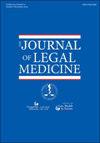安乐死应该在内华达州合法化
IF 0.8
4区 医学
Q3 LAW
引用次数: 0
摘要
安乐死应在内华达州合法化Ellie Ok, MS, OMSII;eok@student.touro.edu克里斯汀·罗萨斯,OMSII;krosas@student.touro.edu Weldon hains, MD, JD, LLM, FCLM,内华达大学骨科医学院名誉教授,目前晚期患者的姑息治疗选择在某些情况下忽视了患者的自主权。这些病人请求安乐死的目的可能是为了做出自主的决定,并重新获得一些因疾病而失去的控制权。作为医生,我们应该努力理解病人要求安乐死背后的理由,以减轻痛苦,并提供最合适的护理,维护病人的尊严和自主权。我们的研究目的是提出在内华达州对晚期病人实施安乐死的合法化。为了检验安乐死的合法性和道德性,我们将四项生物医学伦理原则(自主、正义、有益和恶意)应用于这种做法的使用。分析了荷兰和加拿大安乐死和医生协助自杀(PAS)的病例数。加拿大PAS病例的报告来自区域安乐死审查委员会和中期报告。个别法规和大量的研究进行了审查,以比较安乐死和PAS在不同国家的资格和要求。这项研究发现,在安乐死和PAS都合法的国家,安乐死的发生率高于PAS。在荷兰,2002年和2010年至2018年的安乐死发生率分别为1672、2910、5277、5856、6303和5898,而PAS的发生率分别为184、182、208、216、250和212。在加拿大,2016年至2018年的安乐死案例分别为503例、1960例和2613例,而PAS案例分别为4例、1例和1例。尽管安乐死在美国是非法的,但患者对安乐死的支持度高于PAS,认为安乐死比协助自杀(33%)更容易接受(67%)。我们仔细比较和研究了其他国家的安乐死条件,并为内华达州提出了我们的指导方针。我们承认应该有严格的限制和案件记录,以限制其滥用。需要进一步的研究来检验儿童安乐死或其他弱势群体的有效性。更多2021美国法律医学学院法学杂志2021年第41卷第1期S1, 32-33 https://doi.org/10.1080/01947648.2021.1914484指出对医疗专业人员进行姑息治疗方面的培训和教育。这项研究强调并挑战了改变我们目前的姑息治疗选择的必要性,包括安乐死。参考资料33本文章由计算机程序翻译,如有差异,请以英文原文为准。
Euthanasia Should Be Legalized in Nevada
Euthanasia Should Be Legalized in Nevada Ellie Ok, MS, OMSII; eok@student.touro.edu Kristine Rosas, OMSII; krosas@student.touro.edu Weldon Havins, MD, JD, LLM, FCLM, Emeritus Professor Touro University Nevada College of Osteopathic Medicine Current palliative care option for terminally ill patients disregards the autonomy of patients in some cases. These patients may request euthanasia with the intent to make an autonomous decision and gain back some control that they have lost to the disease. As physicians, we should strive to understand the rationale behind the patient’s request of euthanasia to alleviate suffering and provide the most suitable care that preserves the patients’ dignity and autonomy. The purpose of our research is to propose the legalization of euthanasia in Nevada for terminal patients. To examine the legality and morality of euthanasia, we applied the four biomedical ethics principles (autonomy, justice, beneficence, and maleficence) to the use of this practice. The number of cases of euthanasia and Physician-Assisted Suicides (PAS) in Netherlands and Canada were analyzed. Reports of PAS cases in Canada were obtained from Regional Euthanasia Review Committees and Interim Reports. Individual statutes and numerous studies were reviewed to compare the qualifications and requirements of euthanasia and PAS in different countries. This study found that in countries where both euthanasia and PAS are legal, euthanasia occurs at a higher rate than PAS. In Netherlands, the incidence of euthanasia from 2002 and 2010 to 2018 was 1672, 2910, 5277, 5856, 6303, and 5898 whereas PAS was 184, 182, 208, 216, 250, and 212. In Canada, the occurrence of euthanasia from 2016 to 2018 was 503, 1960, and 2613 compared to four, one, and one PAS cases. Although euthanasia is illegal in the United States, patients showed higher support for euthanasia over PAS, finding euthanasia to be more acceptable (67%) than assisted suicide (33%). We carefully compared and studied the qualifications of euthanasia in other countries to propose our guidelines for Nevada. We acknowledge that there should be strict limitations and documentation of cases to limit its abuse. Further studies are needed to examine the validity of child euthanasia or other vulnerable populations. More 2021 American College of Legal Medicine JOURNAL OF LEGAL MEDICINE 2021, VOL. 41, NO. S1, 32–33 https://doi.org/10.1080/01947648.2021.1914484 training and education of medical professionals in palliative care is indicated. This research highlights and challenges the need for change in our current palliative care options to include euthanasia. References upon request 33
求助全文
通过发布文献求助,成功后即可免费获取论文全文。
去求助
来源期刊

Journal of Legal Medicine
Multiple-
CiteScore
1.10
自引率
0.00%
发文量
3
期刊介绍:
The Journal of Legal Medicine is the official quarterly publication of the American College of Legal Medicine (ACLM). Incorporated in 1960, the ACLM has among its objectives the fostering and encouragement of research and study in the field of legal medicine. The Journal of Legal Medicine is internationally circulated and includes articles and commentaries on topics of interest in legal medicine, health law and policy, professional liability, hospital law, food and drug law, medical legal research and education, the history of legal medicine, and a broad range of other related topics. Book review essays, featuring leading contributions to the field, are included in each issue.
 求助内容:
求助内容: 应助结果提醒方式:
应助结果提醒方式:


